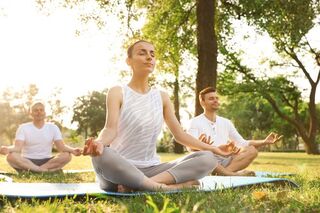Stress
21 Evidence-Based Stress Busting Tips for Crazy Times
Practical evidence-based tools to help you reduce your stress.
Updated July 20, 2024 Reviewed by Gary Drevitch

Feeling stressed and a bit overwhelmed by current events? The world is kind of a crazy place right now. Unless you’re a monk in the Himalayas, you’ve probably been pretty tense lately. Even those normally even-keeled and mild-mannered folks find themselves snapping at family members, irritable and depressed.
If that’s not enough to incentivize you to reduce your stress, look in the mirror. Is your face looking akin to a saggy roadmap lately or your eyes raccoon-like? Stress has unfortunately also been linked to increased aging. If you want to look “Forever 21,” try these stress reduction tips. Enjoy and breathe.
Relaxation and Meditation
1. Deep breaths — Speaking of breathing, here’s an easy one you can do anywhere, anytime: Take four deep breaths. Make the in-breath four seconds, hold the breath seven seconds, and out-breath for eight seconds. Deep breathing activates the body’s Parasympathetic Nervous System (PNS), a counter to our perpetually keyed-up “fight or flight” response.
2. Yoga — I know you’re thinking: “Oh, that just for hipsters and flakes,” but give it a try. Yoga has been around for thousands of years, studied extensively, and found to reduce stress and anxiety. Numerous types of yoga exist, from gentle and slow to actively sweating your cares away. If you cannot find in-person classes right now due to COVID-19, try online classes.
3. Meditation or quiet time — Often we live frenetic lives, with our minds racing to the next obligation, grocery shopping list, or work task. There are numerous ways to meditate, such as mindfulness meditation, that can reduce your stress.
4. Music and sound healing — Music can be soothing and relaxing. There’s an even deeper musical experience called “sound healing” which has been proven to decrease tension and anxiety, which is my research passion. The effects are undeniable. In-person sound healing is most effective, but virtual sound healing may help decrease stress.
5. Gratitude — We can feel a positive emotional shift when we try an exercise like the following for seven continuous days: Write down three things for which you’re grateful, written as “I am grateful for ___,” “I am grateful for ____,” “I am grateful for___.” (It’s even backed up by research.)
6. Spirituality — Many find comfort in spiritual beliefs and prayer. Having spiritual or religious beliefs has been linked to increased well-being. Belief in a higher power may be a welcome comfort in these challenging and uncertain times.

Endorphin Release
7. Laugh — Watch a comedy on TV or better yet, an hour of stand-up comedy. Laughter releases endorphins and makes us feel better physically and emotionally.
8. Cry — Having a good cry and releasing bottled-up emotions is healthy and releases feel-good chemicals in our bodies. Watching a sad movie or crying on our partner’s shoulder might be just the ticket.
9. Watch a happy movie — Forget your coronavirus and political cares for two hours by watching a film that takes you to a happy time and place.
Physical health
10. Exercise — Get those endorphins hopping and feel better with a brisk walk or run, swim, dance, or whatever physical activity gets your heart pumping.
11. Sleep — Our bodies cannot function when our gas tanks are on “Empty." Sleep deprivation has harmful effects physically and emotionally. Get your seven to nine hours each night and feel the difference. (BTW: Women need more sleep than men).
12. Sunshine and sunsets — Daytime: Sunshine feels soothing and provides much-needed Vitamin D. (Just don’t fry your skin.) Nighttime: looking at the stars can also be calming and soothing.
13. Nature — Sit under a tree and close your eyes. Or if you can’t do that, talk to your plants. Sounds silly, but nature has been proven to be very soothing and relaxing.

Nature’s Proven Remedies
14. Relaxing teas — Many teas are designed for relaxation and sleep such as those containing chamomile and/or passionflower. They can provide wonderful relaxation effects.
15. Dark chocolate — Indulge in a happy boost with dark chocolate. Besides tasting yummy, it’s full of healthy flavanol to boost physical health and reduce depressed mood.
16. Lavender — Lavender soothes your sense of smell and has a calming effect. Try lavender essential oil or incense. Breathe in that sweet aroma and relax. Ahhh...
Social Interaction
17. Connect to loved ones — In-person (safely), by Zoom, or by phone. You’ll be glad you did. In fact, connecting to friends and loved ones may assist in resilience during this time of coronavirus.
18. Hugs — Hugging a loved one feels comforting and reassuring, but it may even activate “the love hormone” oxytocin in your brain, giving you a rush of happy feelings. Hug your loved one for at least five seconds to get the full blissful effect.
19. Pets — Snuggle your dog or let your purring cat sit on your lap. Pet therapy is very real therapy, with proven stress-reducing benefits such as lowered blood pressure from our furry four-legged friends.
20. Sexual healing and intimacy — “Sexual Healing” is not just a cool classic Marvin Gaye song from the '80s. Sex between two consenting adults can help bond the partners together, and there are physical relaxation effects through the release of endorphins and oxytocin during intercourse and orgasm. (Remember to be safe).
21. Reach out — When life gets really emotionally challenging, reach out to someone you trust — a close friend or loved one, a spiritual leader/pastor, or a counselor. Don’t try to go it alone; lean on others. You can also be the person that someone else leans on.
- National Suicide Prevention Hotline: 1-800-273-8255.
Remember: Reach out to others!




